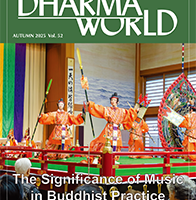October-December 2016, Volume 43(PDF)
Listening
Communication begins with listening. Listening is especially important in vocations such as psychotherapy, hospice care, and social work, which provide mental and spiritual care for people in need. Listening often brings relief to those who suffer and can even help them regain the spiritual strength to move forward.
Listening is essential in religion too, if religion is to bring spiritual liberation. It is no less important than preaching. However, we can listen intently to others only when our minds are free from distraction or preoccupation with passing judgment. One must also put aside any intention to proselytize.
It was in that spirit that in Japan, soon after the disastrous earthquake and tsunami in March 2011, clergy of various faiths visited the disaster areas and together underwent training in careful listening in order to serve as interfaith chaplains to help counsel disaster victims.
Participants in interreligious dialogue must respect one another, whatever their disagreements. Productive dialogue should begin with positive listening free of preconceptions or prejudices. When our minds are open, listening can also bring self-discovery, as well as deeper understanding of the speaker.
We may agree, therefore, that people of faith should be good listeners. But do all of us know what it means to listen to others, or how to cultivate the art of listening? We hope to explore the meaning and role of listening in religion and how as people of faith each of us can learn to become a better listener.























































































